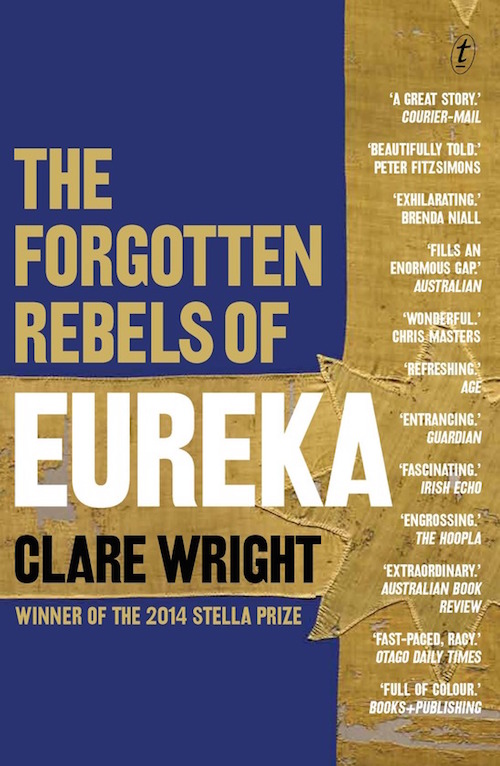
When Vida Goldstein and her fellow suffrage activists vied for women’s rights more than a century ago, they could only dream of a female professional making strides akin to those of Clare Wright. As one of Australia’s most acclaimed authors, historians, and documentarians, Wright has not only epitomizes much of what those pioneering feminists fought to realize – she also works to bring their stories to a whole new generation. Below Wright tells us more about that project, her forthcoming work about Australia’s underground wealth, and more.
At this year’s Bookworm Festival, you are partaking in the "Women’s Rights Around the World," and "Writing With and Against History," talks. Can you tell me a little bit about why you wanted to partake these talks, and why you think they will be compelling and meaningful for attendees?
It is a great honour to partake in the Bookworm Festival in Beijing. I have never been to China before and, as an historian, it’s a great thrill to talk to audiences in a country with such a rich and complex history. These panels are marvellous, as I am teamed up with authors from other nations – something that rarely happens at literary festivals in Australia – so we will be able to give a really broad perspective on the issues under discussion. I love bouncing off other people’s ideas and challenging my own assumptions or perceptions. The panel on women’s rights has such pressing urgency: even though women in countries like Australia have made great strides over the past century in achieving their political and legal rights, there is so far to go before we can be considered to have equal status, equal access and equal entitlement to basic freedoms, like safety in the home. It will be wonderful to see what my fellow panelists think.

You spent a decade researching The Forgotten Rebels of Eureka. Tell me a bit about how you developed such diligence and persistence.
Necessity is the mother of invention – but it’s the mother of diligence and persistence too! Being a working mother of three children, I needed to cultivate patience, commitment and a sense of equilibrium about my writing. It is very hard to get into the ‘zone’ when you have, at first, young children, and get no sleep and your brain feels as soft as butter. Then they get older and you get more sleep, but the pace of life picks up and suddenly you are a taxi. I take the attitude that writing history is not like finding a cure to cancer; no one is going to die while I make peanut butter sandwiches! But the other reason it took me so long to write this book is that there was just so much incredible material waiting for me in the archives. It was all new research, and there was a seemingly bottomless pit to lose myself in. This was an often slow, painstaking journey to dig deeper and deeper into the archive. And I love this process of research. So while sometimes it was frustrating to go so slow, at other times I never wanted it to end!
Your documentary Utopia Girls: How Women Won the Vote was also beautifully researched and presented. What pertinent, present day lessons can viewers learn by watching this vivid historical account?
I wanted to make this documentary because I think that women today – women of my generation and younger – take it for granted that we have freedoms and choices that our grandmothers could never even have dreamed of. As an historian, I knew that the only reason we could take our rights as given is because generations of women before us had fought like demons and made huge sacrifices to better the lives of all women and girls. I wanted to show that story, and I hoped that the lesson would be this: if you see there is a wrong, it takes courage and strength and, above all, action to right it. You have to make history. Nobody hands it to you.
You are an esteemed historian. If you had to choose another era to live in, which would you pick and why?
I would love to spend a year in the gold rush period of the 1850s. Such incredible flux and change. So many possibilities open to make up your own story, live by your wits, follow your dreams and aspirations. On the other hand, women died horrible deaths in childbirth and couldn’t vote – so that would be crap. But if I could travel back in time, I would do anything to sit and have a cup of tea with my hero, Vida Goldstein, leader of the women’s suffrage movement in Australia and international advocate for peace and justice.
What are you working on next, and what aspects of it show your evolution as a writer?
My next project is a new history of mining in Australia. It is a huge project, spanning over two hundred years and a vast continent whose geological windfall has been enormous mineral wealth. It’s also a leap for me away from writing women into history, and instead writing a national history that includes women – but also indigenous people, migrant groups, environmentalists, and unionists. I’m excited and daunted in equal measure!
Clare Wright will be one of four authors appearing at the Bookworm Literary Festival’s "Women’s Rights Around the World," talk on March 12 at 10am. Later that day Wright will also appear at the "Writing With and Against History," talk at 6pm. Tickets for both events are RMB 60.
Photos: The organizers, Text Publishing.



